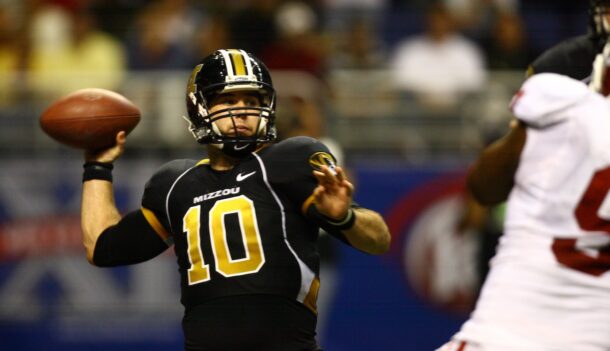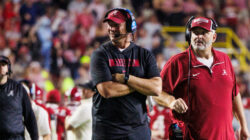By now, unless you took a pre-Easter cruise to Tahiti or have ignored any news pertaining to SEC teams outside of your own, you’ve heard about Alabama’s off-field troubles this spring.
In the course of a few days, Jonathan Taylor (domestic violence, allegations later rescinded), Tyren Jones (marijuana possession) and Geno Smith (DUI) all got arrested.
All three faced previous disciplinary issues.
Taylor, previously a member of the Georgia Bulldogs, got booted from that program after an arrest for domestic violence, and many questioned coach Nick Saban for allowing Taylor to join the Tide out of community college. He’s off the team despite the fact that his accuser now insists she made up the accusations out of revenge.
Smith had a previous DUI arrest and Saban has indicated he’s not off the team, but will have to jump through several disciplinary hoops to come back. Although we don’t know why Jones was in trouble, he missed one game last season due to internal discipline and faced an indefinite suspension before his arrest got him kicked off the team.
The situation at Alabama has forced us to re-examine an overarching question: do college football players deserve second chances?
Auburn fans giggling at the misfortune of the rival Tide must remember a certain quarterback named Cameron Newton. Right? Granted, Newton stole a laptop at Florida, which is why he got banished to community college before leading the Tigers to a national championship. (Oh, and his dad may or may not have solicited a huge sum of cash for his post-community college services.)
Yes, stealing a laptop is different than choking a woman and hitting her with a closed fist, which is what led to Taylor’s arrest at Georgia. But we cannot unilaterally rule that, regardless of the infraction, no college football player deserves a second chance. If that were the policy, a huge number of the SEC’s best players would be forced to star on an intramural flag football squad.
Saban came out following the Taylor news and gave an impassioned defense for giving the defensive lineman a “second” chance (some argue that it was Taylor’s third chance). Before we crucify Saban for having no moral conscience and being way too easy on ethically-bankrupt players, let’s pump the breaks.
Just like with NCAA violations or struggling coaches, what goes around comes around. If it’s not your team, it will be at some point. That’s what always amuses me when one SEC fan base undergoes some sort of negative headline blitz and many other fans go out of their way to delight in the misfortune. Granted, there are coaches with stricter disciplinary policies — Arkansas’ Bret Bielema comes to mind — but at one point or another, all 14 SEC schools have endured some sort of equivalent negative news.
Let’s not be naive here. While all coaches give lip service to caring about the well-being and character development of these young men, in reality there’s a spectrum. The degree to which coaches adhere to that standard varies. But even the most righteous, morally-admirable coach places ethics and character development as priority 1b at best. SEC head coaches got paid about $50 million combined in 2014 — to win games.
Do you think Ole Miss would’ve taken a chance on Chad Kelly, who has a well-documented history of immaturity, petulance and poor behavior associated with alcohol, just to help him get his life on track while he throws the football around in practice and sits on the bench? And do you think that Jameis Winston, if he played a position other than being a catalyst as the star quarterback on a defending national champion would’ve escaped with nothing more than a begrudgingly-granted one-game suspension last year? Please.
I do not believe Saban added Taylor to the roster just out of charity. But I also am not privy to the conversations and research as part of what I can only imagine was due diligence on Alabama’s part in determining whether Taylor was a risk worth taking. Other than Taylor’s family and close friends, Saban and the Tide were in better position to evaluate the player’s character and maturity than any of us in the media or any fan base.
Returning to the question at hand, are there egregious cases where the offending player does not deserve another chance to play college football? Absolutely. Although football has been behind the times on this front, the Ray Rice incident in Baltimore has intensified scrutiny related to violence, especially directed toward women. There’s a strong argument to be made that those types of crimes should fall into the “zero tolerance” category, no second chances granted.
But, regardless of your personal feelings on the issue of marijuana — whether or not it should be legal and whether or not it’s a bad moral offense to partake — the reality is that a huge percentage of college athletes partake at some point during their time at school. There’s also degrees here. Failing a single drug test as opposed to a compulsive user like former LSU defensive back Tyrann Mathieu.
The same goes for drinking and driving. In my view, getting behind a wheel while intoxicated, and putting other human lives at risk, is one of the more selfish and egregious violations of the law one can commit outside of violent crime. But what percentage of college students has ever gotten behind a wheel at least a little buzzed?
Just because a high percentage of the population has done something doesn’t mean it’s OK or acceptable. But neither does it seem prudent to automatically dismiss anyone who ever has a problem missing classes, being late to meetings, petty shoplifting or goes through singular legal incidents involving alcohol or marijuana. Those issues are pervasive across college football and happen with regularity. They’re mistakes, but not necessarily damning character flaws.
(We can make an exception for stealing crab legs, of course. Anyone who does that obviously is evil and doesn’t even deserve to play intramural football!)
Should coaches apply stricter punishments upon the first offense for these seemingly redeemable crimes or missteps? Perhaps. Many times the football outcome equates to a slap on the wrist. For example, Auburn quarterback Nick Marshall missed the first half of the season opener against Arkansas after he was cited for marijuana possession in July. Jeremy Johnson played in his place, and Marshall returned in the second half with a lead. No big deal.
But what if he’d been forced to miss, say, four games? By that point not only would he have missed one-third of the regular season, but Johnson may have put Marshall’s starting job in jeopardy. That sort of punishment and risk could be a stronger deterrent.
Maybe the answer is to involve the parents more, like Bielema did recently when he took away Tevin Beanum’s car privileges outside of driving to class or to practice following a DWI.
Just like we can’t be naive when it comes to the intentions and priorities of coaches, however, we must apply the same spotlight on fans. The ones crying foul the loudest when it comes to the three Alabama arrests, best I can tell, are not Mothers Against Drunk Driving or Citizens Against Legalizing Marijuana. They’re fans of other SEC programs that had to watch the Tide win yet another conference championship in ’14 and jump at the chance to get one over on what’s been the nation’s best program since ’09.
If we’re going to criticize college coaches for caring about nothing but winning, we need to hold ourselves to that same standard. The types of voices that usually spew negativity in these cases resemble witch hunt participants far more than they resemble concerned adults wanting systematic changes to affect positive societal and cultural change.
We should all ask ourselves before lambasting a school, a kid or a coach, why are we so angry? Is it because we want what’s best for the kid, or because we feel like an opposing program is immoral in the way they’re chasing football wins? And what does the answer tell us about our own priorities?
Did Saban make a bad judgment when it comes to Jonathan Taylor? Maybe. Regardless of whether Taylor hit a woman recently or kept his hands to himself. But just because Jones and Smith are repeat offenders (at least of sorts in the case of the running back), we can’t say they had no business remaining on the roster or that Alabama, or any other program with an equivalent situation, should’ve imparted much harsher punishments originally.
Personally, I’d like to live within a culture where, if someone makes a mistake, we give them the opportunity to learn from it and become better men or women in the future.
Depending on the mistake, sometimes that means consequences, even severe ones. At the most extreme, it can mean seeking justice. But the average negative headline generated by a college football player usually deserves a second chance.
It’s a nuanced, complex issue. But blanketly accusing Alabama of failing to kick off all of these wrong-doers the first time they messed up, or any other equivalent situation at one of the other 13 programs, isn’t the way to go.
An itinerant journalist, Christopher has moved between states 11 times in seven years. Formally an injury-prone Division I 800-meter specialist, he now wanders the Rockies in search of high peaks.







